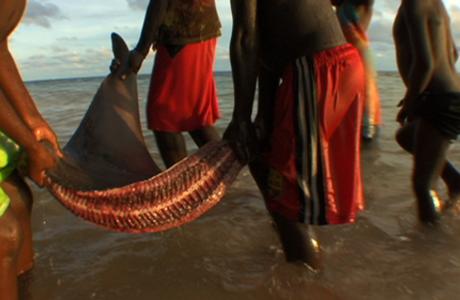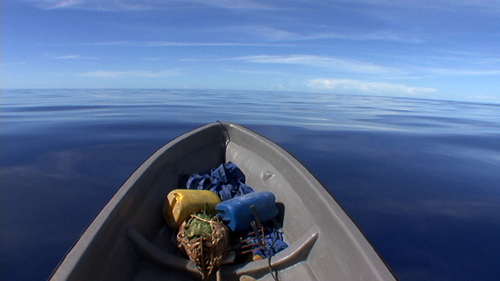
<p><em>Sun Come Up </em>is the first film by Jennifer Redfern and Tim Metzger, and it's nominated for an Academy Award in the Best Documentary, Short Subject category. It tells the story of the Carteret Islanders, whose South Pacific home is being swallowed up by the sea. Redfern and Metzger followed the islanders, and as they searched for a new community to take them in, the two fell in love. Karen Michel has the story.</p>
Copyright © 2011 National Public Radio®. For personal, noncommercial use only. See Terms of Use. For other uses, prior permission required.
SCOTT SIMON, host:
Theres a group of islands on the South Pacific that you probably haven't heard much about and there won't be much time to get to know them. The Cartaret Islanders will be consumed by rising sea levels in the near future and its people will be displaced. The story of the islands and their people is the subject of a documentary called "Sun Come Up." Its nominated for an Oscar in the Best Documentary, Short Subject category.
And as Karen Michel reports, the film brought together its director and its cinematographer in more ways than one.
KAREN MICHEL: "Sun Come Up follows a group of islanders as they seek a new home.
(Soundbite of drums)
Unidentified Man: Last year we had banana trees, sugarcane, some taro. The beginning of this year we had this king tide and this area here was flooded with pure salt water. Destroyed everything we planted. The place is turning to a small desert.
MICHEL: The desert is on the Cartaret Islanders in the South Pacific. Within the few two years, the islands will cease to exist as the sea swallows the land.
Unidentified Man: This is the end of the island. Everybody will be moved out.
MICHEL: Director Jennifer Redfearn first learned of the Carteret Islanders plight in June 2008.
Ms. JENNIFER REDFEARN (Director, "Sun Come Up"): I was shocked, because I didn't know that people were being displaced by climate change right now. And I thought, well, if I don't know that and I have a background in environmental science and journalism, then probably a lot of other people don't know that. And so it struck me as an incredibly important and also compelling story to tell.
Mr. TIM METZGER (Cinematographer): I got an e-mail out of the blue from someone I didn't know saying would I be interesting in meeting to potentially shoot a film in the South Pacific. And so I thought, sure, let's meet.
MICHEL: Tim Metzger is a freelance cinematographer. Jennifer Redfearn had heard of him, got in touch and told him the deal: Their travel expenses would be covered, but neither he, nor she, would be paid. She had some savings, he had some equipment.
Mr. METZGER: It was just a question of was I willing to give a month and a half, possibly two months of my time. And was I willing to go to the South Pacific with this charming young woman. And of course I said yes.
MICHEL: Maybe you heard that tone of his and that laugh of theirs. While spending weeks schlepping gear, powering it with solar cells, rationing water, bathing in the sea, and having very limited food...
Ms. REDFEARN: We fell in love during process of making this film. And I think for both of us it was something that we had wanted to do for a very long time -both fall in love, but also make a film about something that we cared deeply about. And all of these things came together during this project.
MICHEL: As outsiders, Redfearn and Metzger quickly bonded, not just with each other but with the islanders. The film gives the impression that the two outsiders weren't even there.
Mr. METZGER: In every village we would go to the leaders of the village would announce our presence. They would get up and say at the start of the gathering if you're wondering who these white people are they're making a film. You know, they're traveling with us. And pretty much every village we went to you'd think that maybe people would be staring at us, but really the most interesting thing for them was who are the Carteret Islanders.
MICHEL: They went from village to village pleading their case. There were times the filmmakers didn't really understand what was going on.
Unidentified Woman: (Through Translator) The chief of this village said when you are here don't feel afraid. Just feel that you are at home.
MICHEL: It wasn't until later, after getting the footage translated, that Metzger and Redfearn learned they'd filmed a critical moment when a village in Bougainville offered to take in the Carteret Islanders.
(Soundbite of applause)
That surprise was not too different from the way they learned that their first ever film had been nominated for an Academy Award.
Mr. METZGER: You know, we got two separate FedEx packages sitting next to each other in our joint mailbox.
(Soundbite of laughter)
MICHEL: Do you have them here?
Ms. REDFEARN: Yes. I'll show you. That's our invitation. Yes, that's our invitation to the 83rd Academy Awards ceremony. And it came in this beautiful black envelope.
Mr. METZGER: It's like getting a wedding invitation.
Ms. REDFEARN: It is like getting a wedding invitation. It came in this fancy envelope. So I don't think it's a hoax, but you never know.
(Soundbite of laughter)
MICHEL: Jennifer Redfearn and Tim Metzger are now in L.A., getting ready for the big night. Tim's rented a tux, Jennifer's got a good deal, she says, on a designer gown. In a way, it is like a wedding - the wedding they plan to have.
For NPR News, I'm Karen Michel.
(Soundbite of music)
SIMON: You're listening to WEEKEND EDITION from NPR News.
Copyright © 2011 National Public Radio®. All rights reserved. No quotes from the materials contained herein may be used in any media without attribution to National Public Radio. This transcript is provided for personal, noncommercial use only, pursuant to our Terms of Use. Any other use requires NPR's prior permission. Visit our permissions page for further information.
NPR transcripts are created on a rush deadline by a contractor for NPR, and accuracy and availability may vary. This text may not be in its final form and may be updated or revised in the future. Please be aware that the authoritative record of NPR's programming is the audio.



